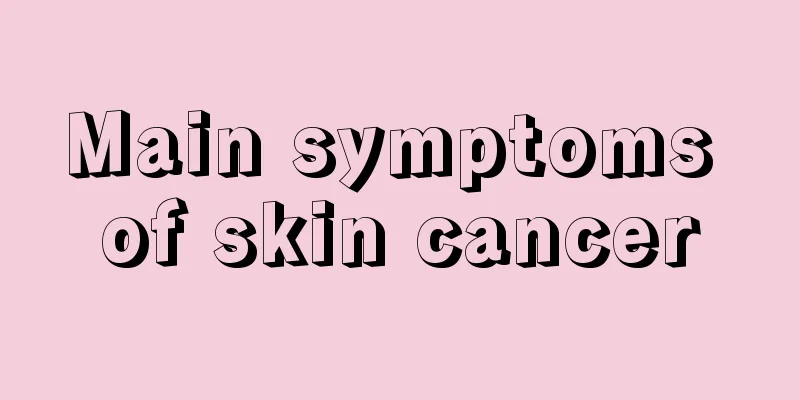Main symptoms of skin cancer

|
The main symptoms of skin cancer include abnormal lumps, ulcers or pigmentation changes on the skin, and treatments include surgical removal, radiation therapy and chemotherapy. The occurrence of skin cancer is related to ultraviolet exposure, genetic factors, weakened immune system function and exposure to chemicals. 1. Abnormal lumps or ulcers: Early symptoms of skin cancer usually manifest as irregular lumps or ulcers that are difficult to heal on the skin. These lumps may gradually increase in size, and scales or bleeding may appear on the surface. If you find such symptoms, you should seek medical attention in time. The doctor may recommend a biopsy to confirm the diagnosis. 2. Pigmentation changes: Skin cancer may cause abnormal skin pigmentation, such as darker moles, irregular shapes, or blurred edges. If an existing mole grows rapidly, has uneven colors, or is accompanied by symptoms such as itching and pain, you should be alert. The doctor may confirm whether it is a malignant lesion through dermoscopy or excisional biopsy. 3. Skin redness or scaling: Some types of skin cancer may appear as skin redness or scaling, similar to eczema or dermatitis. These symptoms may be accompanied by itching or pain and are easily ignored. The doctor will choose local medication, photodynamic therapy or surgical excision according to the condition. 4. New skin lesions: Skin cancer may appear as new skin lesions, such as wart-like protrusions, nodules, or plaques. These lesions may be located in areas exposed to the sun, such as the face, neck, or arms. Your doctor may recommend cryotherapy, electrocautery, or laser treatment. 5. Non-healing skin ulcers: Skin cancer may cause skin ulcers that do not heal for a long time, accompanied by exudation or infection. These ulcers may be located in the original scar or chronic inflammation site. The doctor may recommend debridement surgery, local anti-infection treatment or systemic chemotherapy. Early detection and treatment of skin cancer are crucial. Regular skin checks, avoiding excessive exposure to ultraviolet rays, using sunscreen, and maintaining a healthy lifestyle can help reduce the risk of disease. If you have abnormal symptoms, you should seek medical attention for professional diagnosis and treatment. |
<<: What causes prostate cancer?
>>: Early symptoms of skin cancer
Recommend
I feel itchy after drinking barley and red bean water
Red bean is a crop that only grows in the south. ...
What sex position makes it easier to get pregnant?
Whether male or female, there are many things to ...
How long can you live with mid-stage lymphoma
How long can a mid-stage lymphoma patient live? L...
Is a nylon spatula safe?
Many friends may not have heard of the nylon spat...
What are the symptoms of different types of gliomas
Glioma is a common disease that occurs in the bra...
What should I do if the thermometer is broken?
Thermometers are very common in daily life, and t...
What to do if a fracture is infected after surgery
We all know that fractures are common. The incide...
The role of elastin
Loving beauty is women's nature. Nowadays, wo...
How to cure early cervical cancer? What are the causes of these cervical precancerous lesions?
Cervical cancer is a very common cancer among fem...
What to do if mites grow on the nose
In our lives, there will be some mites on our clo...
What is chronic vulvar dystrophy
Many middle-aged women often experience severe it...
The difference between sanguine and choleric
Everyone has different personality traits, but so...
What are the symptoms of bile duct cancer
Cholangiocarcinoma is often difficult to be disco...
Why is my urine dark brown?
The normal color of urine is light yellow. When c...
How should lung cancer patients eat after surgery? There are two things to pay attention to in diet after lung cancer surgery
Whether the diet is reasonable or not has a great...









